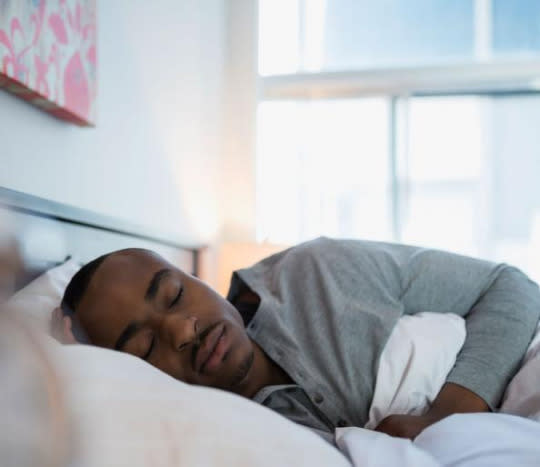7 Ways You're Destroying Your Sleep Cycle

(Photo: Corbis)
You know the drill by now—no caffeine after 3pm, avoid late night spicy foods if you don’t want to be up with indigestion, kick the blanket-hogging dog out of the bed. But if you’re practicing good sleep hygiene and still tossing and turning at night (or feel exhausted every. single. morning.) one of these other factors could be robbing you of rest.
Related: 10 Best Ways To Get Better Sleep
1) You Don’t Keep a Regular Bedtime
You’re up until 2 a.m. one night, so you tuck in the following night at 8:30 p.m. hoping to catch up, right? Bad idea, says Breus: “You’re messing with your circadian rhythm, which can leave you feeling wired and tired. And when we can’t fall asleep we get annoyed, which adds to arousal.” Worse yet: A brand new study in the Journal of Clinical Enocrinology & Metabolism found that even “routine” sleeping habit changes (like waking up earlier on the week days for work and sleeping in on the weekends) can put you at risk for metabolic issues ranging from diabetes to heart disease.
Always try to go to bed within 30 minutes of your normal bedtime to stay on schedule, even if you only got a few hours the night before.
2) You’re Snacking Wrong
Going to bed hungry can keep you up—but so can grabbing the wrong late night grub. Packing on the protein (as in, munching on all the leftover steak from dinner) can make you feel more alert, so pick something that’s easy to digest like a bowl of cereal, says sleep specialist Michael Breus, Ph.D. “The ideal sleep snack has around 250 calories and is 80 percent carbs and 20 percent protein.” For a sleepy boost, pick tart cherries (which have sleep-enhancing melatonin) or kiwis, which have a high serotonin content and can help regulate your sleep cycle.
Related: Will Boozing Before Bed Wreck Your Sleep?
3) You’re Popping Energizing Meds and Vitamins
“B Vitamins are good for sleep in general, but not great to have at night because they have a tendency to give people more energy,” says Breus. “The same goes for Vitamin D, so you’ll want to take those two in the morning.” Certain medications can also have a stimulating effect on the nervous system (or include sneaky sources of caffeine) so read the label before tossing them back. Excedrin, Wellbutrin, and some nasal sprays like Afrin are a few meds best taken in the AM.
Related: 10 Allergy Remedies That Wont Make You Drowsy
4) You’re Not Staying Cool Enough
It’s cozy as hell to pile on the fleece sheets and down comforters in the winter, but don’t blast the heat when it’s time to get into bed. “Being cool helps us fall and stay asleep. You want the ambient temperature to stay around 68 to 72 degrees,” says Breus. (Saving money on the heating bill doesn’t hurt, either.)
Related: Fit Fix: Cooling Your Home Helps You Lose Weight
5) You’re Glued To Your Screen
Blue light (which is emitted from your laptop and computer screens) gets as bad a rap as refined carbs these days, and for good reason: the late night glow can halt the production of melatonin, an important sleep hormone. So what can you get away with? “It depends on how close the light is to your eyeballs, and how long you’re looking at it,” says Breus. Reading one quick email before bed isn’t going to keep you up for hours, but an intense 30 minute game of Candy Crush Saga might. “When the brain is engaged, it’s probably going to affect your sleep.” (In fact, a study from the journal Organizational Behavior and Human Decision Processes found that people who used their phone for work after 9 p.m. reported less sleep and were less engaged in work the next day.
Related: Is Sleeping With The TV On Making You Depressed?
6) You’re Exercising Too Late
“There are two types of people—those who get energy from exercise, and those who relax from exercise,” says Breus. If you feel geared up after knocking out 12 miles on the treadmill, limit workouts to the morning or afternoon. Feel zonked after the gym? Try to go at least three hours before bed.
Related: 6 Late Night Habits Ruining Your Sleep
7) You’re Keeping the Room Too Quiet
Your hearing gets better when it’s quiet, so it’s a good idea to sleep with some noise. The term white noise is thrown around a lot, but pink noise (a perfectly consistent frequency) is super effective for drowning out honking cars, slamming doors, or any other sound that may disrupt your sleep. Need more incentive? In one study, 75% percent of study participants reported more restful sleep while listening to pink noise.
By Kristen Dold
